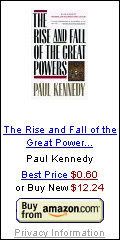
Will the Iraq war end, and US interventions in the Middle East come to a close with the exit of President George W Bush from the world stage? No. That die was cast long ago, when cities like Los Angeles were built the way they are. There might be numerous reasons to eject the Republicans from office, and elect a Democratic president. But ending the Iraq war is not among them.
When the Democratic Party won a majority in the House of Representatives, and a nominal majority in the Senate, last year, some expected it to be the beginning of the end of the military involvement in Iraq. For several reasons that was always unlikely to be the case.
On November 16th of last year, just after the Democratic Party victory in the mid-term elections, I wrote the following, which I think holds up pretty well, in light of the recent developments:
The point is, the Democratic Party majority in Congress could end the war in Iraq at any time they chose to do so after the turn of the year, by simply cutting off the funding for it, as Rep. Dennis Kucinich (D-OH) recently suggested. But, that might be construed as being soft on terror, weak on defense, cutting and running, so of course they won’t.
Chances are that the Democratic victory in the mid-term elections won’t change the timing of the American pull-out of Iraq by as much as one hour. The troops will leave when their presence there becomes untenable, mainly for economic reasons, and not one second before.
The war in Iraq will drag on. Further conflicts and interventions will be deemed necessary, some of them even justifiably so. Deficits and debts will grow, undermining the economic base, which supports the structure of power. And history will, by and large, stay its course.
While the collapse of the Congressional majority in the game of chicken with the White House on writing President Bush a blank check for further funding for the war, sans any meaningful benchmarks for progress, discouraged many grass roots Democratic activists, it was widely accepted as only the first skirmish in a more long term campaign. General Petraeus, the new commander in the field, would report back to Congress in September, by which time, it was claimed, an evaluation could be made on whether the troop surge had had any effect in quelling the violence, opening the door for a wider political solution to the ethnic and religious strife. If, as is overwhelmingly likely, no real progress had been made, the option was then available to use the parliamentary power of the purse to press for an end to the occupation at the next funding crossroads.
That seems highly unlikely at the moment. Not only has the administration started to de-emphasise the September progress report (in fact the talk now is of an open ended multi-decade engagement comparable to Korea), but the Democratic Part opposition has also moved the goal posts up the field and into the stands. Yesterday the influential Democratic Senator Carl Levin of Michigan, who is also the present Chairman of the Senate Committee on Armed Services, wrote, in the Washington Post, that he could not imagine voting against funding the ongoing mission in Iraq.
[…] I cannot vote to stop funding the troops while they are in harm’s way, conducting dangerous missions such as those recently begun north of Baghdad. I agree with Lincoln, who decided “that the Administration had done wrong in getting us into the war, but that the Officers and soldiers who went to the field must be supplied and sustained at all events.” As long as our nation’s policies put them there, our troops should hear an unequivocal message from Congress that we support them.
That shouldn’t be a cause for frustration among those of us who want to bring the war to a prompt and responsible end.
The gist of the matter is that yes, this effectively pushes any real effort on ending the war ahead to the Presidential elections of 2008, which was always the date that most realist opponents of the war pinned their hopes to anyway. The problem is that even this realist wing of the anti war movement will probably be in for a disappointment. The reason is not only the perennial fear of Democratic presidential candidates of being tarred as soft on defence. Aside from craven political calculation, there are also deep geopolitical reasons why this is so.
Other than New Mexico Governor Bill Richardson, every other declared Democratic candidate for the presidential primary have been careful to not nail their flag to the mast of complete withdrawal from Iraq, or ruling out a wider conflict with neighbouring Iran. The original proponents of the war from the disparate coalition making up the modern Republican Party might have had different motives for advocating the invasion. There is of course the much talked about neoconservatives, whose motives ranged from misguided idealism, again of a sort, to making the Middle East safe for Israel. There was the religious right, who had their own reasons for wanting a show down between good and evil in Biblical lands. And there’s the Cheney wing, guided by avarice, mainly for the oil resources under the sands of Araby.
In the end, this group was probably not only the deciding vote in favour of the war, but also the one whose concerns are closest to the realpolitik consensus inside the Washington establishment, on both sides of the aisle, and not only for reasons of personal economic interests. What we are dealing with here is nothing less than the survival of US power in the world, and the standard of living for average Americans. The supremacy of the United States dates back to the last transition of the primary energy source. The British Empire, whose home islands were little more than a giant coal field protruding from the ocean, had ruled the waves, and industry, through steam power. When petroleum became the principal energy source the United States, which at the time had abundant domestic reserves, and the culture and technology to exploit them, was in a prime position to usurp the global hegemony.
But in the early ’70s the United States reached the so called Hubbert’s Oil Peak, when domestic petroleum production crested and went into an irreversible decline. It’s no mere coincidence that this time also marked the beginning of ever growing trade and current account deficits, which now threaten to overwhelm the economic base of the country.
The implications of Peak Oil are widely misunderstood. The world will never run out oil, whether vegetable or mineral. The Petroleum Age will not end on a fixed date, when the last drop of crude falls from some spigot in the desert sands, any more than the Stone Age ended for lack of stones. What is running out is cheap oil, easily extracted, easily refined oil. At some point prices will simply rise to, and stay at, a level where running all the transport and industry we do with it at the present becomes economically unviable.
That is the spectre that haunts the corridors of power in Washington DC. So many American cities, and not least suburbs, were, if not founded, then at least shaped during the Petroleum Age. It can be difficult for say, an urban European from Paris, Berlin, or London, never having been there, to fully fathom just how shaped, by nature and design, the American landscape is for the automobile.
Drive-to and drive-through are facts of everyday life. Your friends might live within “driving distance”, but hardly close enough for the horses of the apostles to carry you, and probably nowhere near any form of public transport. There might be a store within walking distance. But the one carrying the items you need will require driving. Your local ATM mini-bank will in all probability be a drive-through. And trying to walk up to it to withdraw some cash involves the risk of a giant Ford truck screeching around the corner on the same errand and flattening you. In short; a car is not a luxury, or even a convenience – it’s a necessity of life.
It is only when you truly consider the staggering investments sunk into the basic infrastructure and very fabric of this society, and the even greater disruptions and costs of changing it, that you can appreciate the reluctance to let go of the Petroleum Age, and understand, on some level at least, the not alltogether nefarious, motives behind trying to lay claim to the biggest source of this resource.
Even though the establishment of the Democratic Party might initially have disagreed with the invasion of Iraq being a wise course of action, they are none the less aware that, barring a fundamental technological breakthrough, the fate of the nation, and their own power, rests on securing what remains of world petroleum resources in American hands. And with the Bush administration having put the national chips on the table on an all out bet on doing it through military means, chances are that any future administration would feel it had few options other than to follow through on the bet. The only question is, what price would it be willing to pay?
This article is also available at Bits of News





History can suck on a very deep level when you have to live through it 😉
Those of us lucky to live in older US cities like Philadelphia (home of BMT), Boston, and NYC know exactly what you’re talking about. That’s why it’s always so weird for me when I leave the city to see how sprawled out everything else is: in fact, while city life in the murder capital of the USA is ever more stressful, on those occasions when I’m in the burbs or the country, all i can think is how unsustainable that kind of lifestyle is, and how lucky I am to live in a city. Our rowhouses conserve heat and energy; our density puts groceries, pharmacies, and banks within walking distance; and our public transit (admittedly underfunded poorly managed in Philadelphia and Boston) helps keep wasteful cars off the road.
Kunstler points out repeatedly how unsustainable our current lifestyle is. Also worrth checking out are Wendell Berry’s meditations on sustainable cities (which includes Philadelphia).
Your diary comes closest to admitting the truth about the war and the democrats. We’re going to have to get in their faces to end this war, over and over again. Protest shortened and ended the Vietnam war. The same will be true for this one, if enough Americans get involved.